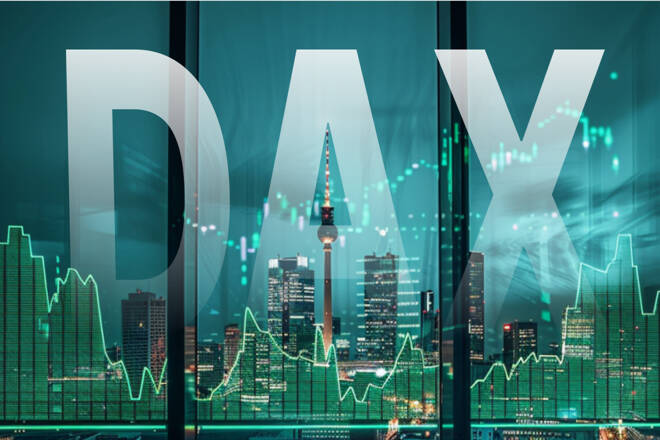Advertisement
Advertisement
DAX Index News: Fed Rate Cut Bets Support DAX Amid Weak Eurozone Data – Outlook Today
By:
Key Points:
- DAX rallies 1.03% as Siemens Energy surges 5.12%; ECB rate cut and lower wholesale prices fuel investor optimism.
- US producer prices increase 1.7% YoY, raising speculation of a 50-basis point Fed rate cut and boosting DAX demand.
- Near-term DAX outlook hinges on Eurozone industrial production data and Fed rate path as recession fears linger.
Market Overview
On Thursday, September 12, the DAX rallied 1.03%, following a 0.35% gain from the previous day to close at 18,518.
Key DAX Market Movers
Siemens Energy rallied 5.12%, while SAP and Infineon Technologies saw gains of 2.45% and 1.32%, respectively. The ECB cut interest rates on Thursday, driving buyer demand.
Commerzbank extended gains from the prior day, advancing by 2.18% on news of UniCredit buying a 9% stake.
Plunging German Wholesale Prices Signal Economic Strain
On Thursday, German wholesale prices declined by 1.1% year-on-year in August, after falling by 0.1% in July. The marked fall indicated a weaker demand, bolstering expectations of an ECB rate cut.
The ECB Cuts Interest Rates
Later in the Thursday session, the ECB cut interest rates in line with expectations and lowered its 2024 growth forecast from 0.9% to 0.8%.
If the global economy avoids a recession, lower borrowing costs could boost company earnings and stock prices.
The ECB interest rate cut and bets on a December ECB rate cut further drove buyer demand for DAX-listed stocks.
Eurozone Industrial Production in Focus
On Friday, September 13, industrial production figures for the Eurozone will draw investor interest. Economists expect industrial production to fall by 0.3% in July, after a 0.1% decline in June. Weaker-than-expected numbers could test market risk sentiment as recessionary risks linger.
US Economic Indicators Fuel Speculation About a 50-Basis Point Fed Rate Cut
On Thursday, softer producer prices raised expectations of a possible 50-basis point September rate cut, supporting demand for DAX-listed stocks.
Producer prices increased by 1.7% year-on-year in August, down from 2.1% in July. Downward trends could signal weak demand, possibly dampening demand-driven inflation.
According to the CME FedWatch Tool, the chances of a 50-basis point September Fed rate cut jumped from 14.0% on Wednesday to 45.0% on Thursday. A soft US landing and a more dovish Fed rate path could fuel buyer demand for riskier assets.
US Market Trends
On Thursday, September 12, the US equity markets extended gains from the previous session. The Dow and the S&P 500 rose by 0.58% and 0.75%, respectively, while the Nasdaq Composite Index advanced by 1.00%.
US Economic Calendar
On Friday, September 13, the Michigan Consumer Sentiment Index will draw investor interest. Economists expect the Index to increase from 67.9 in August to 68.0 in September. Higher-than-expected numbers could ease fears of a hard US landing, possibly supporting demand for riskier assets.
However, investors should also consider subcomponents, including Consumer Expectations. Concerns about the economic outlook and the labor market could adversely affect riskier assets. As investors raise expectations of a possible 50-basis point Fed rate cut, signals of a US economic recession could impact demand for DAX-listed stocks.
Expert Views on the Fed Rate Path
Wall Street Journal Chief Economics Correspondent Nick Timiraos quoted Jon Faust, Powell’s former senior adviser:
“I don’t think we’re in a spot that really shouts out for a pre-emptive 50. But my preference would be slightly toward starting with 50. And I still think there’s a reasonable chance that the FOMC might get there as well.”
Near-Term Outlook
Near-term DAX trends will likely hinge on upcoming US data and central bank commentary. Support for Q4 2024 ECB rate cuts and multiple Fed rate cuts could push the DAX toward 18,750. However, fears of a hard landing could overshadow dovish ECB and Fed rate comments, possibly dragging the DAX down to 18,000.
In the futures markets, the DAX and the Nasdaq mini were up by 79 and 3 points, respectively.
Investors should stay alert to central bank chatter and economic indicators that may influence risk sentiment. Monitor the news wires, the economic calendar, and expert commentary to manage trading strategies.
Stay informed with our latest news and analysis to manage your risks effectively.
DAX Technical Indicators
Daily Chart
The DAX sat above the 50-day and 200-day EMAs, sending bullish price signals.
A breakout from Thursday’s high of 18,596 could signal a move toward 18,750. Furthermore, a return to 18,750 may bring the all-time high of 18,991 into play.
Eurozone and the US economic indicators require consideration amid fluctuating sentiment toward the Fed rate path.
Conversely, a break below the 50-day EMA could signal a fall toward 18,200.
The 14-day RSI at 52.61 suggests a return to the all-time high before entering overbought territory.
About the Author
Bob Masonauthor
With over 28 years of experience in the financial industry, Bob has worked with various global rating agencies and multinational banks. Currently he is covering currencies, commodities, alternative asset classes and global equities, focusing mostly on European and Asian markets.
Advertisement
